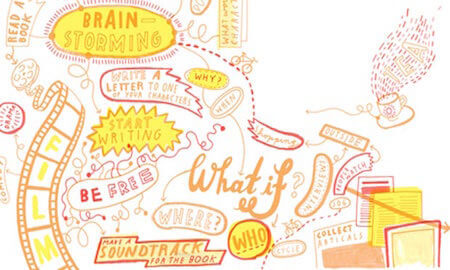Ever spaced out in class? It's possible that your learning needs are not being met. Every person has an individual learning style, which means that we all learn best under slightly different conditions. The three main learning styles are visual, auditory, and kinesthetic. Which category do you fall into?
Visual Learners
- If you are a visual learner, you probably learn best with the aid of visual cues, like pictures and graphs.
- For example, if your English teacher uses a Venn diagram to illustrate the differences and similarities between two novel study books, visual learners will be more likely to retain the information than if your teacher had simply discussed the books with the class.
- If you are a visual learner, there are a few things you can do to adjust your study habits accordingly: make charts, use different colored highlighters, and/or use brainstorming tools like a mind map before starting a project.
 Visual learners may benefit from pictorial brainstorming.Courtesy of The Guardian
Visual learners may benefit from pictorial brainstorming.Courtesy of The Guardian
Auditory Learners
- An auditory learner depends on hearing and speaking to take in knowledge.
- If you are an auditory learner, you probably rely on speaking out loud and even repeating information multiple times to fully process it.
- Auditory learners are often creative and enjoy speaking aloud in front of the class, as well as acting or performing.
- If you are an auditory learner, here are some tips on how to organize your schoolwork in order to learn best: repeat information out loud, read aloud to yourself or others, listen to music or have the television on in the background when you are studying, and/or always choose an oral test over a written exam if you can!
 Auditory learners are often very talented actors!Courtesy of wallpaper222.com
Auditory learners are often very talented actors!Courtesy of wallpaper222.com
Kinesthetic Learners
- Kinesthetic learners retain information best when there is a physical component involved.
- If you are a kinesthetic learner, you may think of yourself as a "do-er," meaning that you need to (and like to) do hands-on activities in order to understand a problem or complete an activity.
- Kinesthetic learners will easily lose focus if not stimulated by a movement-based activity; for example, a kinesthetic learner is likely to be unable to concentrate for a long period of time on an oral lecture or a written project.
- If you are a kinesthetic learner, it might help you to take active breaks, like going for a walk or doing some yoga, during studying time. Taking notes during class might also help you focus, because it gives you something to do with your hands.
 Are you a kinaesthetic learner? Make sure you take a physical break now and then!Courtesy of pressdemocrat.com
Are you a kinaesthetic learner? Make sure you take a physical break now and then!Courtesy of pressdemocrat.com
You probably identify most with one of these particular learning styles, but really every person's learning needs are made up of different pieces of the visual, auditory, and kinesthetic styles. Most of your teachers probably try to incorporate activities that will meet all these needs into most of their lessons, but it's still valuable for you to be aware of what learning style fits you best. Once you know how you learn, you can make sure to keep your own needs in mind during activities, studying, and exams.
Have Your Say!
What's your learning style? Our Kidzworld readers want to know!

































